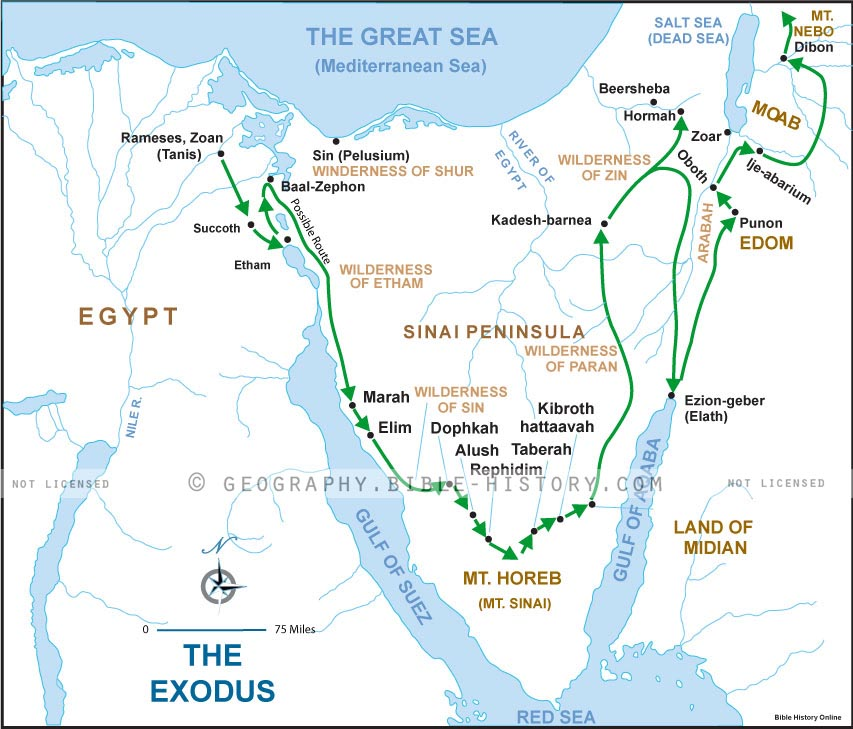8. Take the rod--which had been deposited in the tabernacle (Nu 17:10), the wonder-working rod by which so many miracles had been performed, sometimes called "the rod of God" (Ex 4:20), sometimes Moses' (Nu 20:11) or Aaron's rod (Ex 7:12).
JFB.
The Book of Numbers
Numbers 14:14 - And they will tell [it] to the inhabitants of this land: [for] they have heard that thou LORD [art] among this people, that thou LORD art seen face to face, and [that] thy cloud standeth over them, and [that] thou goest before them, by day time in a pillar of a cloud, and in a pillar of fire by night.
The Old Testament - A Brief Overview
Bible Survery - Numbers
Hebrew Name - Bemidhbar "in the wilderness"
Greek Name - Numbers "numberings"
Author - Moses
Date - From 1490-1451 BC Approximately
Theme - The Journey to the Promised Land
Types and Shadows - In Numbers Jesus is the Pillar of Cloud by
Day and the Pillar of Fire by Night
The book of Numbers takes its name from the account of the census that happened two times among the congregation of Israel in Numbers 1-4 and Numbers 26. The Greek title was used even though there is really no connection with the "numberings." The original Hebrew title which means "in the wilderness," is much more accurate, because the book of Numbers is it's really an accurate history of the events that happened during the period of wandering in the wilderness and not necessarily a book about statistics. The book of Numbers seems to follow naturally after the book of Leviticus in the order of the books of Moses in the Old Testament. After the children of Israel received the laws at Mount Sinai, they began the journey as described in the book of Exodus, and they were ready to march directly into the land of Canaan. The book of Numbers reveals how the children of Israel became prepared, and went to various trials, and how they were sinful in not trusting the Lord. Their sinful ways resulted in 37 years of wandering through the harsh wilderness. The book of Numbers concludes with the children of Israel once again at the edge of the land of Canaan, where they received instructions for the conquest of Canaan and the division of the land.
Quick Reference Map

Map of the Possible Route of the
Exodus (Click to Enlarge)
The principle divisions of the book are as follows:
Outline of the Book of Numbers
1) The preparation for the departure from Sinai (1:1-10:10). The events described here took place in nineteen days. In this time a census was taken of all men who were over twenty and who could serve in military efforts (1-4). The total obtained was 603,550 (1:46). This would indicate that the total population of the group was probably near three million. The census was followed by the cleansing and blessing of the congregation (5-6), the offering of gifts from the various tribes (7), the consecration of the Levites (8) and the observance of the Passover at Sinai (9:1-14).
2 ) The journey from Sinai to Kadesh-barnea (10:11-14:45). This section includes the account of the coming of the quail (11), the rebellion against Moses by Miriam and Aaron (12), and the fateful mission of the spies (13, 14).
3) The wanderings of the desert wilderness (15-19). As noted above, this covered a period of thirty-seven years, from the end of the second to the beginning of the fortieth year in the wilderness. Ch. 15 includes various laws and a record of capital punishment for Sabbath breaking. The rebellion of Korah (ch. 16) and the budding of Aaron's rod (ch. 17) are also mentioned here.
4 ) The history of the last year, from the second arrival of the Israelites at Kadesh till they reach "the plains of Moab by Jordan near Jericho" (20-36: 13). Notable sections of this are the story of Balaam (22:2-24:25), the zeal of Phinehas (ch. 25), the second census (26:1-51) , instructions for dividing the land (26:52-27: 11), the appointment of Joshua as Moses' successor (27: 12-23), various laws concerning offerings and vows ( 28-30 ), the war with Midian (ch. 31), the settlement of the tribes east of the Jordan (ch. 32), a review of the locations at which Israel had camped during their wanderings (33: 1-49), more instructions concerning the conquest and division of Canaan (33:50-34:29 ), the appointment of the cities of refuge (ch. 35) and instructions concerning the marriage of land-owning Israelite women (ch. 36).
ARCHAEOLOGYAncient Bronze Snake
Bronze Snake from Lachish, Late Bronze Age
Quick Reference Maps - Numbers
Numbers Resources
More About the Book of Numbers
Numbers in
the Picture Study Bible
Timeline of the Ancient
World
Back to the Old
Testament
Back to Bible
History Online